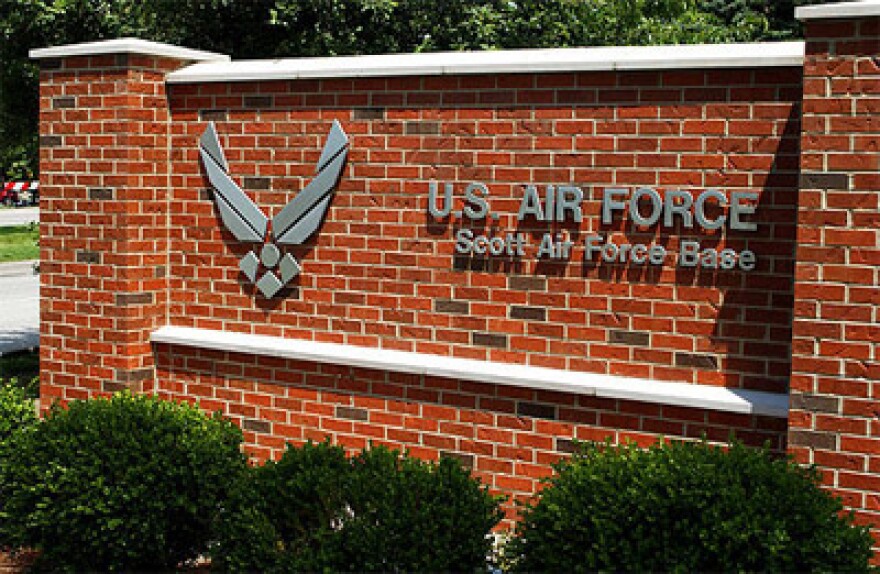Their jobs were to protect Scott Air Force Base and those who live and work there.
But a search warrant affidavit stated that two security force members sold drugs out of a Soulard stash house and at the military base.
Senior Airman Kolby Carter now faces general courts-martial — the most serious level of court-martial — while Senior Airman Sheldon Timmermeyer faces special courts-martial.
U.S. District Judge Patricia Cohen unsealed a search warrant in the case last week. The search warrant was obtained by Air Force Office of Special Investigations Special Agent Shane Flannery. He asked the court to allow a search of Timmermeyer’s house in Soulard earlier this year.
“ … I believe that controlled substances, drug proceeds, and/or documents evidencing participation in drug trafficking and the laundering of drug proceeds will be found at the aforementioned target location,” the affidavit stated.
Timmermeyer, 25, and Carter, 23, are both assigned to the 375th Security Force which provides a law-enforcement presence on the base. The unit protects resources, monitors personnel and visitor access and investigations support.
According to Flannery’s affidavit, the investigation began late last year when a confidential source stated Carter was actively using cocaine every other week.
Flannery stated that Carter later agreed to sell that confidential source a gram of cocaine. On Nov. 9, Carter drove a white 2009 BMW to pick up $80 from the source for the cocaine. He later told the source to go to an address in the 2500 block of S. 12th Street in St. Louis and wait. The apartment and BMW were both listed in Timmermeyer’s name.
On the street outside the stash house, Flannery stated Carter gave the source a substance that later tested positive as cocaine. During the exchange, agents engaged in surveillance overheard Carter say he was under the influence of cocaine and Adderall, a prescription stimulant.
A month later, Flannery stated in his affidavit that Carter sold cocaine to the source as well as an undercover special agent on Scott Air Force Base.
On Dec. 8, another confidential source was invited to a party at the Soulard house. There were about 20 people at the party, including Timmermeyer and Carter. Timmermeyer sold Ziploc bags of pills to people at the party, the affidavit stated, while Carter sold cocaine.
Four days after the party, Carter, driving a newly purchased red 2015 Mercedes-Benz, went to the Soulard house, then to a Walmart in Illinois where he sold an undercover agent a gram of cocaine.
“Timmermeyer and Carter are both military police and therefore have intimate knowledge of police tactics and capabilities,” the affidavit stated.
Both men had low-level security clearances, according to Karen Petitt, a Scott Air Force Base spokeswoman. She confirmed the charges against the men.
The search warrant stated agents were looking for drugs, records, phone bills, photographs, money, papers, tickets and any occupancy permits, leases, ownership of cars, phone bills and keys.
Ernesto Gapasin is a former judge advocate general. His civilian practice consists of defending those accused in military courts. He said drug trafficking is a very serious offense. If convicted, Carter and Timmermeyer could be dishonorably discharged, lose their pay and rank and face five years confinement.
“From time to time, you do see military personnel engaged in the distribution of drugs both off base and on base,” Gapasin said.
The process of a court-martial is different than civilian court, Gapasin said.
The defendant can choose to have the case be decided by a judge or a panel of five to 12 officers. In this case, because the accused are not officers, they may elect to have one to four members of the panel be enlisted men.
The list of potential jurors is specially selected every year by the base commander, Gapasin said. These are not housewives or retired people, but mostly officers who understand the dangers of having a weak link in the command, Gapasin said.
“These will be the best and the brightest. The wisest in the tribe,” he said.
Those jurors must find beyond a reasonable doubt that the service member committed the crime, like civilian criminal court. Unlike civilian court, a military proceeding doesn’t need to be unanimous. It takes two-thirds of the jurors to vote for conviction.
And if the service member is convicted, they are immediately sentenced.
The case is currently docketed for late September or early October, according to base spokesman Petitt.
Timmermeyer and Carter are currently handling administrative duties.
Follow Beth on Twitter: @bhundsdorfer
Send questions and comments about this story to feedback@stlpublicradio.org.




